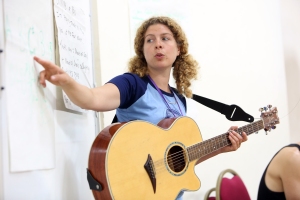 On 15-16 February Trinity Laban welcomes 22 brand new students as the first student cohort of our newly accredited The Teaching Musician Programme – a Postgraduate Certificate/Diploma in music education practice.
On 15-16 February Trinity Laban welcomes 22 brand new students as the first student cohort of our newly accredited The Teaching Musician Programme – a Postgraduate Certificate/Diploma in music education practice.
The Teaching Musician was designed as a flexible and vocational professional development programme and at its heart is the idea of learning within a community of practice.
The phrase ‘community of practice’ was first coined by anthropologists Lave and Wenger:
“Communities of practice are groups of people who share a concern or a passion for something they do and learn how to do it better as they interact regularly.”
The Teaching Musician is open to all musicians working in any educational setting (Instrumental/Vocal teachers, Music Hub staff, Visiting Artists in Schools, Community Musicians, SEN/D music specialists, ensemble leaders) and facilitates the bringing together of these practitioners. These individuals all have different perspectives, knowledge and expertise but ultimately, are united through the same passion for music education. By learning, sharing and discussing together they will diversify and develop their practice.
Along with the new students we will be welcoming a brand new teaching team as well. Led by our resident lecturer in music education Tim Palmer, the programme is to be delivered by a pool of expert tutors including Rob Wells, Dave Camlin, Philippa Bunting and Janet Munro. Furthermore, the programme sits within the Learning and Participation Music team, adding another layer of support and opportunity to the students involved.
All in all, it’s a very exciting programme and, as the project manager, I can’t wait to meet, and be a part of, this new community of learning.
